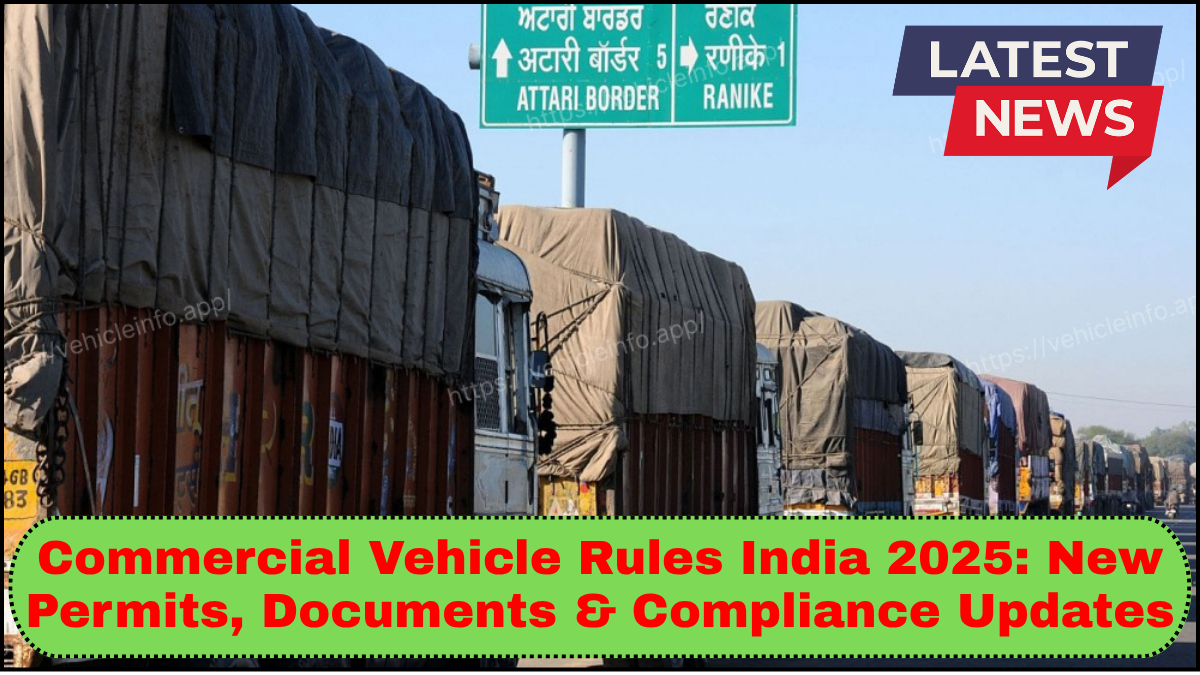The Commercial Vehicle Rules 2025 mark a significant shift in India’s transportation and logistics landscape. With the rising demand for safety, environmental responsibility, and digital compliance, the Ministry of Road Transport and Highways (MoRTH) has rolled out a series of updates that every fleet operator, logistics company, and commercial driver must understand and implement.
These new rules are not just regulatory upgrades—they’re designed to streamline operations, promote cleaner mobility, and enhance road safety. Here’s a detailed breakdown of what’s new in 2025, including permit changes, mandatory documents, and critical compliance requirements.

Stricter Permit Norms Under Commercial Vehicle Rules 2025
One of the major updates involves the overhaul of the permit system for commercial vehicles. The focus is on making the process more transparent and less bureaucratic, while ensuring better traceability and accountability.
-
Unified National Permit System: Starting 2025, a centralized digital system will be used for all inter-state and national permits. This replaces the older state-wise fragmented model. The move enables easier tracking, renewal, and monitoring of all commercial vehicle movements across state borders.
-
Eco-Friendly Permit Prioritization: Electric vehicles (EVs), hydrogen-fuel vehicles, and CNG/LNG-powered commercial fleets will be prioritized during the permit allotment process. Operators with clean-energy fleets may get fee concessions and faster processing.
-
Smart Permit Validation: QR-coded permits will now be issued, readable by traffic enforcement systems and mobile apps. These will include data such as vehicle class, route limits, expiration date, and emissions class.
Mandatory Documents: What Every Operator Must Carry
The Commercial Vehicle Rules 2025 emphasize complete and up-to-date documentation. Enforcement agencies will be using e-verification platforms extensively, making it impossible to operate with incomplete or outdated papers.
Here’s what’s mandatory:
-
Vehicle Registration Certificate (RC)
-
Fitness Certificate (FC) – Must be renewed every year for vehicles over 8 years old
-
Insurance Certificate – Minimum third-party cover; comprehensive preferred
-
Pollution Under Control (PUC) Certificate – Now linked to an automated emissions tracker
-
Driver’s Commercial License – With upgraded training module certification
-
e-Way Bill (for goods vehicles) – Mandatory for consignments exceeding ₹50,000
Operators must also keep digital copies of these documents accessible via DigiLocker or mParivahan, in line with the new paperless directive.
Compliance Regulations to Watch in 2025
Compliance is no longer just about avoiding penalties—it’s central to staying operational. Authorities will be using AI-powered surveillance, road-side inspections, and automated data cross-checks.
Key areas of compliance include:
-
Fleet Emission Standards: As of 2025, all newly registered commercial vehicles must comply with Bharat Stage VII norms. Non-compliant fleets may be denied renewal permits or fined heavily.
-
Digital Tracking and GPS Mandate: All commercial vehicles, including goods carriers and public transport buses, must have functional GPS trackers linked to the Vahan portal.
-
Driver Hours and Safety Compliance: New rules limit continuous driving hours to 8 per shift. Tachographs and onboard monitoring devices are required to ensure this is followed.
-
High Security Registration Plates (HSRP): HSRP with color-coded fuel indicators is now compulsory. Tampering or missing plates will attract instant fines and permit suspensions.
-
Annual Vehicle Safety Inspections: Mandatory physical inspections to assess braking, lighting, emissions, and structural safety. Vehicles failing the test will be deregistered temporarily.
How Fleet Operators Can Stay Ahead
To ensure smooth operations under the Commercial Vehicle Rules 2025, fleet owners should take a proactive approach:
-
Invest in Tech: Adopt fleet management software that tracks compliance, documents, GPS, and driver behavior.
-
Train Drivers: Conduct refresher courses focusing on road safety, fatigue management, and digital documentation.
-
Green Fleet Upgrade: Transition to electric or alternative fuel vehicles wherever possible for regulatory and financial benefits.
Staying compliant isn’t just about avoiding penalties—it builds trust with clients and improves operational efficiency.
FAQs on Commercial Vehicle Rules India 2025
Q1: What is the biggest change introduced in the Commercial Vehicle Rules 2025?
The centralization of permits under a unified digital system and the mandatory use of GPS and digital documents are among the most significant updates.
Q2: Are older vehicles still allowed under the new rules?
Only if they pass annual safety inspections and meet emissions standards. Vehicles over 15 years may face phase-out mandates in pollution-sensitive zones.
Q3: Do EV commercial vehicles need the same permits?
Yes, but they get fast-tracked approvals and may receive financial incentives or toll exemptions.
Q4: What happens if a commercial vehicle doesn’t have a PUC or GPS?
The vehicle may be fined on the spot, impounded, or denied entry into low-emission zones.
Q5: Is digital documentation mandatory or optional?
Mandatory. Physical documents are still accepted, but carrying digital copies is strongly encouraged and often faster during checks.
click here to learn more